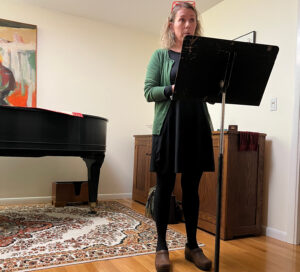
Poet Emily Kerlin reads from. her chapbook in progress, December 9, 2022
I was invited to read from my new book this weekend by old friends John and Lois Palen, who host a literary salon in their home for thriving poetry and writing communities in Champaign, Illinois, home of the flagship university in the state. John is a poet and Lois a musician. It was marvelous.
My experiences with readings, whether others’ or my own, have almost always been in city bookstores, churches, and especially college auditoriums and classrooms. Most were hosted by a university writing program, or the author was on a book tour with a major press. Only once have I read in another setting, for a riotous brunch book club—older ladies in a small coal town who plied me with homemade elderberry wine and wanted to discuss the naughty bits of my novel. (Only once because no other such opportunities presented themselves.)
For many years, readings fell into the standard format of a speaker at a podium, often given 30-40 minutes to read something from the new book, followed by Q&A. The reading was only interesting to me for seeing writers in person whose work I liked since I could read the words myself on the page in my own time, and to try to bridge that gap between person and page. The questions that followed had interest because they seemed to reveal aspects of process, craft, and what we might call the business end of writing. More recently, the trend is for the writer to be “in conversation” with another person on stage, and that can be interesting too.
But the salon is a different idea, and I like it. In the old days, a salon was a carefully chosen group, often with different views, who gathered to talk about literature, art, politics, and current events. The space it happened in was more intimate and private than, say, a coffeehouse or pub, perhaps even in a host’s bed chambers. The emphasis was on stimulating discussion, as opposed to delivery of literary product, in the atmosphere of ease and plenty, with good food and drink.
Champaign-Urbana has long had an active community writing scene. The Red Herring group, some of whose members were at the salon, has been around for more than forty years. Few writing faculty in my time at Illinois went to these sorts of groups’ workshops and readings, and few community members I know of were specifically invited to university events. I have found this town-gown split to be true in three cities/universities where I have taught, and it seems a shame, most likely a consequence of the academy’s intended role as professional gatekeeper in all things intellectual and artist in its realm, including creative writing.
The Palens’ salon, in a large, comfortable room filled with chairs, a grand piano, and art from artists in places they have lived, was mostly full. Attendees ate from a potluck buffet and chatted before my co-reader, poet Emily Kerlin, read, followed by me. Afterward we all mixed and ate a little more, had something to drink, and said goodnight before it got late. A method to be recommended.
